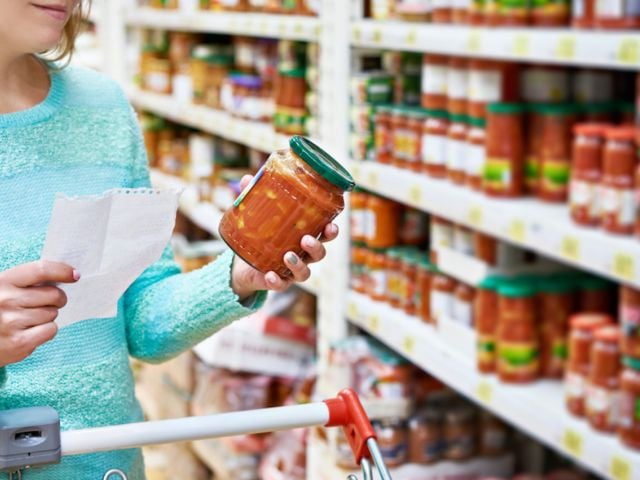
Just in time for the long Memorial Day holiday weekend, EWG released our 11th annual Guide to Sunscreens, along with lists of best- and worst-scoring sunscreens for kids.
This week we also joined other consumer, health, and food safety groups in a lawsuit against the Food and Drug Administration for illegally giving food and chemical companies the authority to decide what chemicals and other substances can be added to processed foods.
EWG Assistant General Counsel Tina Sigurdson said:
Industry has its bottom line profits in mind, not consumer or environmental safety. Leaving it up to industry to regulate itself is a classic case of the fox guarding the henhouse at the expense of public health.
The Trump administration released its proposed budget, which guts the Environmental Protection Agency and the U.S. Department of Agriculture. Budget cuts include vital programs that reduce farm pollution, including dangerous pesticides and pathogens from animal waste, in rural communities. This means millions of Americans who were key in electing Trump will be rewarded with filthy drinking water. EWG President Ken Cook said:
This isn’t a budget – it’s a roadmap for the president, EPA Administrator [Scott] Pruitt and polluters to see that millions of Americans drink dirtier water, breathe more polluted air and don't have enough nutritious food to lead healthy lives.
But to end on a high note, some good news: cleaning products giant SC Johnson announced that it will disclose hundreds of potential skin allergens that could be found in its products.
Again, Ken Cook:
SC Johnson is once again raising the bar for other companies. This level of transparency is sweeping across other industries and is rapidly becoming the new normal for companies, like SC Johnson, who place a premium on giving consumers more, rather than less ingredient information.
We hope you have a wonderful Memorial Day weekend. Here’s some news you can use as you head into the long break:
Sunscreens
TODAY: Does your sunscreen work as well as it should? New report rates leading brands
For the report, researchers at the EWG reviewed nearly 1,500 products, including sunscreens, moisturizers that contain SPF and lip balms, according to the group. Just over one-quarter of the 1,500 products met EWG's strict guidelines: about 300 sunscreens, just over 100 moisturizers and nearly 40 lip balms.
Yahoo! Beauty: 73 Percent of Sunscreens Don’t Work as They Should, According to 2017 Guide
“The vast majority of sunscreens available to Americans aren’t as good as they should be,” Sonya Lunder, senior research analyst at EWG and lead author of the guide, said in a press release. “Sunscreens will not improve until the Food and Drug Administration sets stronger rules, reviews harmful chemicals, and allows the use of new ingredients that offer stronger UVA protection.”
USA Today: Is your sunscreen protecting you? Report ranks sunscreens
“People are still confused about sunscreen and how it works and what the drawbacks may be,” according to Sonya Lunder, a senior analyst at Environmental Working Group.
CNN: Experts' tips for choosing the safest sunscreen
"Sunscreens are really mismarketed, and as a result, people who depend on them think they are far more powerful than they really are," said Sonya Lunder, a senior analyst with the environmental advocacy group and lead scientist of the 2017 Sunscreens Guide.
Goop: Even We Were Surprised By Stuff in EWG’s New SPF Report
Thank god for EWG, because they keep evaluating and re-evaluating—not just products themselves but studies upon studies upon studies, all with the aim of helping us figure out what our safest options might be when we need to go in the sun. (Yes, it’s a crime that it’s as difficult as it is to figure out.)
Health: 7 Mineral Sunscreens That Are Perfect for the Beach and Sports
The EWG prioritizes mineral sunscreen ingredients over chemical ones in their annual ranking. If that’s important to you too, then these products fit the bill. Sonya Lunder, a senior analyst at the EWG, told Health the beach and sport sunscreens on the group's list underwent a thorough review process before being rated on a scale of 1 to 10, with 1 being the best.
Business Insider: Why relying only on sunscreen this summer could be dangerous for your skin
"In the studies that have been done to date, people who use sunscreen actually use it to spend more time in the sun, in which case you're really negating any potential benefit of the sunscreen," David Andrews, PhD, a senior scientist for the EWG, told INSIDER. “The sunscreen reduces the UV exposure, but if you end up spending much more time in the sun, you may actually be getting more UV light, in which case you may not necessarily be doing better off.”
Live Science: New Sunscreen Recommendations for 2017: Here’s What to Look For
For the report, researchers at the EWG reviewed nearly 1,500 products, including sunscreens, moisturizers that contain SPF and lip balms, according to the group. Just over one-quarter of the 1,500 products met EWG's strict guidelines: about 300 sunscreens, just over 100 moisturizers and nearly 40 lip balms.
Mindbodygreen: 73 Percent Of Sunscreens Don't Work. Here Are The Ones That Do
"Sunscreen alone may not reduce risk of melanoma, the most deadly form of skin cancer, because it prompts users to spend more time out in the sun, where they get more total UV and more sunburns," explains EWG senior research analyst Sonya Lunder.
Mic: The best sunscreens to buy this summer
On Tuesday, the Environmental Working Group, a nonprofit organization focused on human and environmental health, published a ranking of the worst-scoring sunscreens for babies and kids, many of which can be spotted at your local pharmacy. Several of these worst offenders are sold in aerosol spray cans, which should be avoided by kids and adults, since the "sprays don't provide a thick and even coating on a skin and pose an inhalation hazard," according to Sonya Lunder, a senior analyst at the EWG.
Popsugar: The Most Dangerous Sunscreens For Kids (and They're Probably Hiding in Your Beach Bag)
Along with wearing sunglasses and hats, sunscreen should always be a part of your family's Summer routine — but is the sunscreen in your beach bag right now actually safe? The EWG released its annual list of the sunscreens with the worst ratings for 2017 to alert parents.
TIME: 6 Best Mineral Sunscreens To Bring to the Beach
The EWG prioritizes mineral sunscreen ingredients over chemical ones in their annual ranking. If that’s important to you too, then these products fit the bill. Sonya Lunder, a senior analyst at the EWG, told Health the beach and sport sunscreens on the group's list underwent a thorough review process before being rated on a scale of 1 to 10, with 1 being the best.
TIME: 7 Best Moisturizers With Sunscreen
On the hunt for the perfect daily moisturizer that hydrates skin and delivers sun protection? The Environmental Working Group (EWG) recently released its annual ranking of the best sunscreen products in different categories, including their favorite moisturizers with SPF. The EWG prioritizes mineral sunscreen ingredients over chemical ones in their annual ranking, so if that's important to you too, any of their top picks would be a good choice for your everyday skincare routine.
Vice: Sunscreen Sold in the US Prevents Burns But Not Necessarily Cancer
The Environmental Working Group released its 11th annual Guide to Sunscreens Tuesday, just in time to scare everyone into canceling their Memorial Day plans. This year, the EWG rated nearly 1,500 sunscreens, moisturizers, and lip balms that touted sun protection, and found that 73 percent of those products "don't work well" or "contain worrisome ingredients."
Trump Budget Guts EPA and USDA
Associated Press: Trump budget slashes money of clean air and water programs
“This proposal would guarantee more children will suffer life-threatening asthma attacks and be forced to drink water polluted with pesticides and other toxic chemicals,” said Ken Cook, president of the Environmental Working Group. “It is crystal clear that for President Trump, public health protection is not a priority, but a target.”
Washington Post: EPA remains top target with Trump administration proposing 31 percent budget cut
Ken Cook, president of the Environmental Working Group, echoed the exasperation of many in the environmental community. “This isn’t a budget — it’s a road map for the President, EPA Administrator Pruitt and polluters to see that millions of Americans drink dirtier water, breathe more polluted air and don’t have enough nutritious food to lead healthy lives,” he said in a statement. “With each cut in EPA funding, each regulatory rollback, each special favor for polluters, it becomes more clear that for President Trump, public health protection is not a priority, but a target.”
The budget also would eliminate an insurance policy that allows farmers to guarantee revenue based on harvest prices, instead of those projected before planting, when the former is higher, saving $11.9 billion over 10 years. Both proposals have floated around for years, and are backed by groups like the conservative Heritage Foundation and the Environmental Working Group, along with the likes of Rep. Ron Kind (D-Wis.) and Sens. Jeff Flake (R-Ariz.) and Jeanne Shaheen (D-N.H.), all of whom have introduced legislation on this front.
Politico: Trump's budget takes aim at SNAP, crop insurance
“Most farmers would relish the thought of having $500,000 in adjusted gross income, or have crops that were so valuable that they received $40,000 a year in premium subsidies,” said Scott Faber, EWG’s vice president of government affairs. “The vast majority of farmers aren’t experiencing that kind of financial success.”
Trump’s EPA
Bloomberg: Chemical Defender Put in Charge of EPA Unit Overseeing Toxins
Scott Faber, vice president of Government Affairs for the Environmental Working Group, called Beck’s appointment, in an administration that has pledged to drain Washington’s swamp, “the most brazen act of hypocrisy yet. There’s no one who has done more to delay and ultimately deny protection from chemicals linked to cancer than Nancy Beck. Trump’s EPA has completely abdicated its responsibility to keep us safe.”
Truthdig: Defender of Chemical Companies Takes Charge of EPA Unit Overseeing Toxins
Scott Faber, vice president of Government Affairs for the Environmental Working Group, called Beck’s appointment, in an administration that has pledged to drain Washington’s swamp, “the most brazen act of hypocrisy yet. There’s no one who has done more to delay and ultimately deny protection from chemicals linked to cancer than Nancy Beck. Trump’s EPA has completely abdicated its responsibility to keep us safe.”
FDA Lawsuit
Earthjustice: Groups Sue FDA To Protect Food Safety
Center for Food Safety (CFS), Breast Cancer Prevention Partners, Center for Science in the Public Interest, Environmental Defense Fund, and Environmental Working Group—represented by legal counsel from CFS and the environmental law firm Earthjustice—are suing the agency for illegally delegating that authority to self-interested food and chemical manufacturers.
Today, EDF and our colleagues at the Center for Food Safety (CFS), Breast Cancer Prevention Partners, Center for Science in the Public Interest, and Environmental Working Group, represented by CFS and the environmental law firm Earthjustice, joined in filing suit against the FDA for unconstitutionally and illegally delegating that authority to self-interested food and chemical manufacturers.
Food Safety Magazine: Lawsuit Against FDA Alleges Illegal Use of Food Additives
The five groups—the Center for Food Safety, Breast Cancer Prevention Partners, the Center for Science in the Public Interest, the Environmental Defense Fund and the Environmental Working Group—are alleging that the government is allowing food companies themselves to determine what chemicals and additives are safe, which they believe is illegal.
National Law Review: NGOs Sue FDA Over Generally Recognized As Safe Notification Rule
The lawsuit – filed by the Center for Food Safety, Breast Cancer Prevention Partners, Center for Science in the Public Interest, Environmental Defense Fund, and the Environmental Working Group – recites many of the prior concerns voiced by the NGO community with respect to substances that companies self-determine are GRAS. In particular, the lawsuit alleges that FDA is required to review the safety of a substance before it can be used in or in contact with food, and that the Agency has therefore failed to meet its duty by not reviewing the safety of substances that companies self-determine are GRAS, noting that some self-determined GRAS substances should be considered “food additives-in-fact” and on that basis, are subject to premarket review under the food additive regulatory framework.
SC Johnson
Bloomberg BNA: SC Johnson to Expand Skin Allergen Disclosures in Products
“There is movement across different industries to increase transparency, not as much as cleaning products as we’ve seen in personal care perhaps,” Nneka Leiba, deputy director of research at the Environmental Working Group, told Bloomberg BNA.
Happi: SC Johnson To Disclose Potential Skin Allergens
“This is a groundbreaking disclosure of allergens in cleaning products from SC Johnson. By taking these steps, SC Johnson will help millions of consumers be smarter about chemicals in cleaning products that have the potential to cause allergic skin responses. And SC Johnson is once again raising the bar for other companies. This level of transparency is sweeping across other industries and is rapidly becoming the new normal for companies, like SC Johnson, who place a premium on giving consumers more, rather than less, ingredient information," said Ken Cook, president and co-founder of Environmental Working Group.
The so-called Regulatory Reform Act
Mother Jones: The “License to Kill” Bill Is As Terrifying As It Sounds
Fourteen national environmental groups are urging the Senate to vote against the bill. Scott Faber, vice president of policy at the Environmental Working Group, said if the Regulatory Accountability Act passes, its effects would be felt long after the President has left office. "Trump is temporary but the 'License to Kill bill' is forever," Faber said. "If Congress permanently throws sand into the gears of our regulatory process that creates consumer protections, it will be a generation or more until we can do the damage."
Utility Dive: Senate panel advances deregulation bills, including controversial RAA
According to the Environmental Working Group, the RAA and a few other bills "would create an impenetrable gauntlet of studies and reviews that no regulator could ever navigate."
Personal Care Products Safety Act
Milwaukee Courier: Are Your Hair Care Products Making You Ill, New Legislation May Help
The definition of personal care products referred to as “cosmetics” by law are not only hair care products but consist of lotions, toothpastes, deodorants and many more products people use daily, according to the Environmental Working Group.



